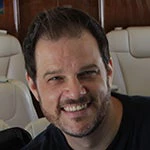
Editor's Note:
Welcome to the “10 Candid Career Questions” series, introducing you to the infrastructure and PPP professionals who do the deals, analyze the data, and strategize on the next big thing. Each of them followed a different path into infra and/or PPP practice, and this series offers an inside look at their backgrounds, motivations, and choices. Each blogger receives the same 10 questions that tell their career story candidly and without jargon. We hope you will be surprised and inspired.
1. What was your first job?
I did not last very long in my first job! I was 15 and waiting for my high school basketball season to start. I thought I should get a part-time job to earn some money. Never having worked before, I had no skills or experience, so I searched through the classifieds in my hometown newspaper. I saw an ad promising a chance to earn huge money for just a few hours of work each day, so I called. The next thing I knew I was being interviewed for a job selling aluminum siding for houses. Yes, my first job was a door-to-door salesman! I had no idea what I was getting into, but every day after school I would walk the streets of Saskatoon, Canada, knocking on doors and trying to convince people to buy aluminum siding. I HATED IT! But I learned to accept rejection, which stood me in good stead when I started dating a couple years later….
2. What was your best job?
The best job I ever had was the four summers I spent guiding canoe trips in northern Saskatchewan, Canada. I would spend two months living out of a tent in the woods taking travelers through some of Canada’s most spectacular lakes and forests. A truly great job.
3. What do your family members think you do all day at work?
Sit at a desk…. And they’d be right! They used to see me a lot on the news when I was working for UNICEF in Iraq during the war or in Sri Lanka during the tsunami, so they have some idea of my job as a spokesperson. But beyond that, I don’t think they really know my daily routine.
4. What do you really do all day at work?
I sit at a desk! But frankly, my days are ever changing. One of the great parts of being a Communications Officer is that my job is dynamic. It is never the same. It is fast paced and exciting. My day revolves around a combination of more proactive work (supporting our project teams and government clients to plan and implement stakeholder engagement and communication strategies) and more reactive work, such as responding to requests from the media and other stakeholders, content generation, and risk management. Every day is different…but I still end up sitting at a desk and wish I could do my job from a canoe instead!
5. What do you wish you did all day at work?
I used to be a bicycle messenger in Australia (2nd favorite job) and if I won the lottery, I would go back to spending my days on a bike delivering packages and staying in shape. Although my wife never liked how I smelled when I did that job, so she might have something to say about this.
6. What is your go-to industry website?
As a communications professional, any and all media are go-to sites. Some great sites for learning about development are the Stanford Social Innovation Review, Institute for Development Studies, Gapminder, and the Center for Global Development. I am also a huge fan of Paper.li, where you can create your own daily newspaper by using their software to curate the best links in your Twitter feed. My paper is the Aid Examiner and I follow many other Paper.li curators who focus on development, PPPs, and infrastructure financing. And, this helps content find me instead of me trying to find content.
7. What did the book that made the biggest impact on you professionally teach you?
It is more the people I have met and those who mentored me that have had the greatest impact. I think the lessons they taught me have been largely about how people matter. People in the countries we work in, people we work with, the people we need to reach out to as our partners. Global development is incredibly complex and requires people working across institutions and regions and working at multiple levels. Engaging with people and respecting their views and contributions is critical for all of our efforts to succeed.
8. What are you shocked to hear yourself say when you give advice to young professionals?
“Remember when everything was filled out in triplicate using carbon paper? No? What about cassette tapes? No? Sigh….”
9. What is the most rewarding thing you have experienced in the course of PPP practice?
Working closely with governments and communities to understand what the real problems are they are trying to address, and not simply focusing on the PPP itself. Once we have a better appreciation of the challenges and constraints a country is trying to overcome on a larger sectoral level, then it becomes easier to see how a particular PPP can help support them in achieving specific goals. That is quite exciting.
10. In what ways do you think the PPP area you work in will look different in 10 years?
I think for my job, people will remain at the center of what I do. The platforms will continue to evolve as technology changes, so we will have a larger variety of tools for engaging with each other. But the quality of that engagement will always be the most important factor.


Join the Conversation